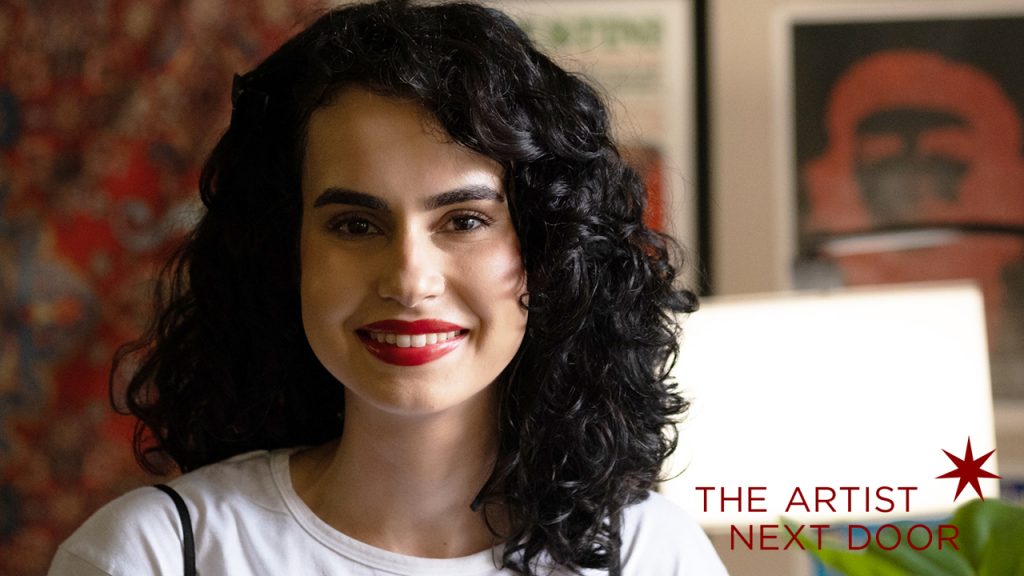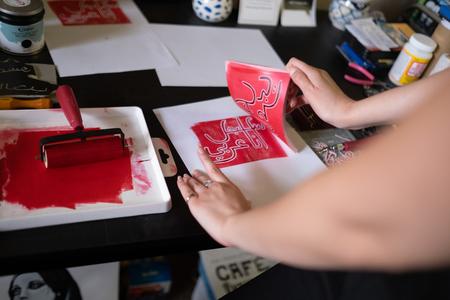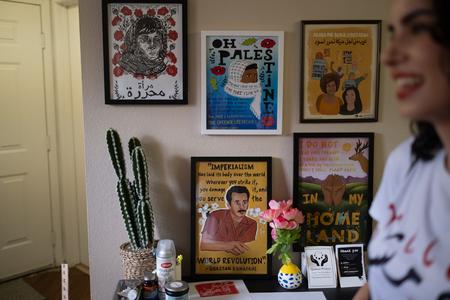In Danya Zituni’s Artwork, Arab American Women See a Reflection of Themselves
Arab American printmaker and illustrator Danya Zituni feels like the community she comes from is ultimately her audience, but she also wants to build bridges to other communities that don’t look like her.

The Artist Next Door illuminates and celebrates Detroit area artists from a variety of cultural backgrounds and disciplines to enhance awareness and understanding of our communities and cultures.
There are three simple and important ingredients to the artwork of Danya Zituni — community, resistance and resilience.

“I’m an Arab American illustrator and printmaker. I make prints that feature Arab women and people engaged around social justice,” says Zituni, taking a minute to explain her practice in her apartment-turned-studio in Dearborn.
Zituni is also influenced by other types of artwork. She recently drew inspiration from an iconic poem written in 1964 by Palestinian poet and writer Mahmoud Darwish. It’s formally titled “Bitaqat huwiyya,” or identity card, but it’s popularly known across the Arab world as “Write Down, I am an Arab.”
“That quote has always spoken to me, especially when I was coming into my identity as a conscious Arab American in college. This poem was always in the back of my mind,” says Zituni.
“Write down! / I am an Arab / And my identity card number is fifty thousand / I have eight children / And the ninth will come after a summer / Will you be angry?” –Mahmoud Darwish, Palestinian poet and writer
Zituni is the daughter of working-class Arab immigrants from Libya (her father) and Syria (her mother).
“That makes me half-Libyan, half-Syrian, but I identify as Arab American. It’s almost a political identity,” says Zituni. “This idea of being Arab — uniting with people from across 22 different countries that are classified as Arab — was popularized during the 1950s and 1960s, especially when the height of the anti-colonial independence movements were happening in the Arab region.”
Zituni says found her love for illustration and cultural work for her broader community here in Dearborn when she was actually on the southwest side of Chicago, working for the Arab American Action Network. She was teaching mainly Arab American teenagers different types of artists workshops.


“I was thinking about fun and engaging ways to talk about our history, to learn about social justice and to learn about our culture,” says Zituni. “A lot of the young boys would say, ‘isn’t painting this feminine thing?’ And I would say, ‘no! You’re expressing your culture and heritage.’ And that was their way of being comfortable with it.”
Zituni feels like the community she comes from is ultimately her audience, but she also wants to build bridges to other communities that don’t look like her.
In one of the prints she made that’s hanging up in her apartment, it reads “Arabs for Black Liberation.” It features Arabic women holding protest signs aligning with that cause depicted in her signature style.
“I think it’s important that the Arab community understands as well as explicitly supports the struggle of Black people in this country,” says Zituni. “There’s a lot of similarities that we can make connections with. Not out of pity, but out of being two strong, resilient communities that have a common interest to stand together.”
Zituni says she’s received positive feedback from the community she’s aiming to represent, which includes putting Arab American women front and center.
“Arab women tend to really love that I highlight Arab women in my work,” says Zituni. “Even in commissions that I do, whenever I’m asked to do something, I usually will draw an Arab woman in the center, because people don’t expect that we’re at the forefront of social movements. But I think reality paints a different picture, and so I’m trying to capture that reality.”
Related: Meet WDET’s Artists Next Door
Sign-up to stay up to date on Artist Next Door:
Trusted, accurate, up-to-date.
WDET strives to make our journalism accessible to everyone. As a public media institution, we maintain our journalistic integrity through independent support from readers like you. If you value WDET as your source of news, music and conversation, please make a gift today.
